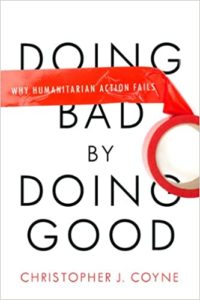The Center for Disease Control issued an order on September 1 that tenants earning less than $99,000 a year who fail to pay their rent due to COVID-19-related financial hardships cannot be evicted for non-payment of rent until at least January 1. This raises a number of legal, ethical, and logistical questions, not least of which is whether a public health agency staffed by non-elected officials even has the authority to effectively command specific people to provide free housing for other specific people for any amount of time. Further, if enforceable, such an edict has the potential to cause some serious long term damage that could wind up hurting renters.

There’s a long history of antagonism towards landlords in the popular imagination. Like owners of other resources, landlords are sometimes considered to have not really earned their money. To be social parasites who don’t even deserve rights. Even Adam Smith seemed to express distaste for the occupation, writing that “As soon as the land of any country has all become private property, the landlords, like all other men, love to reap where they never sowed.” (Of course, I think the clause “like all other men” is important here as well—wanting to put your situation to its best advantage is hardly unique to owners of rental property.) And I’m not deaf to the sentiment myself, having met a number of wonderful landlords but also a couple real stinkers who wouldn’t give back a deposit if you spit shined the place.
However, love ‘em or hate ‘em, Smith also recognizes that landlords and other resource owners play an important part in the process of bringing much-needed resources to the market:
In other words, if for any reason there is a temporary shortfall of a product—whether because of increased demand or some kind of shock to the existing stock or productive capacity—the price is going to go up. This will in turn drive up the price of at least some of the inputs to production, including possibly the rental price of the land production takes place on. (Smith was focused here on commodity production, but the same principle applies in a modern housing rental market.)
When prices go up is when the landlord will tend to be most hated. But it’s also their time to shine. The increase in rental prices makes it worthwhile for financially capable individuals to seek out additional land that could be rentable, or to rent land that was previously held idle because the going rate couldn’t cover the bother of renting it out.
Having people in the economy with a strong incentive to provide additional housing is a very good thing. There is already a serious problem with the exorbitant price of housing in urban markets, and I can’t imagine that this action by the CDC is going to encourage anybody who is on the fence to start renting out additional property. Landlords are, after all, not really lords, but mere humans who have their own children to feed and bills to pay. What happens if non-payment of rent is going to prevent them from paying their own mortgage? Will rent default insurance become prohibitively expensive, forcing some who offer rental properties to pull out of the market? Such effects are particularly likely to impact the kind of landlords who rent out small numbers of properties, which could concentrate the market even further around less flexible corporate entities. The potential for long chains of unintended consequences abounds.
Hopefully the fact that housing prices are currently down in some of the country’s most expensive markets will help prevent this order from being too painfully binding. But at the end of the day, any political action that makes offering rentals more difficult could wind up creating a lot more harm than good for renters. I’m reminded of my colleague Chris Coyne’s argument for adopting a constrained vision when trying to help others, taking seriously the limits of what can be achieved given the inevitability of scarce resources and imperfect people:

Jayme Lemke is a Senior Research Fellow and Associate Director of Academic and Student Programs at the Mercatus Center at George Mason University and a Senior Fellow in the F.A. Hayek Program for Advanced Study in Philosophy, Politics, and Economics.
As an Amazon Associate, Econlib earns from qualifying purchases.


READER COMMENTS
Stephen
Sep 5 2020 at 3:11pm
Isn’t mandated rent-free housing a variant of rent control? As a CPA, I encounter many small landlords who have 1 or 2 rental homes. Most have held them for decades, suffering through years of negative cash flow in order to capture ultimate price appreciation in the property. Don’t cry for them because none are poor, but some are withdrawing properties from the market if they are lucky enough to have tenants who move out and if they can afford absorbing costs in the meantime. With contracts being over-ridden by legislation (California) or executive order (Trump Administration), they are holding off engaging in new contracts because the State won’t uphold them. Anecdotal, to be sure, but the incentives are strongly oriented toward shrinking, not adding to, the supply of housing.
john hare
Sep 6 2020 at 5:27am
Looking towards buying a house locally in central Florida. Waiting until early next year when we expect a serious price drop after the politicians are through buying votes.
BC
Sep 6 2020 at 7:00am
Because the eviction moratorium is also income-dependent, to the extent that the moratorium influences expectations about what future moratoriums might look like, the moratorium is likely to harm low-income renters disproportionately. Renting to low-income tenants now carries more risk relative to high-income tenants than before because it is more likely that lease terms for low-income tenants specifically will be set aside in the future. Markets rents will adjust to, implicitly, include an insurance premium that renters pay to landlords to compensate landlords for “moratorium risk”. That premium will be larger for low-income tenants than for high-income tenants.
Thomas Hutcheson
Sep 6 2020 at 9:04am
Of course the analysis of why the eviction moratorium is bad is correct, but I notice that it fails identify the problem and to propose solution, treating rather like an exercise in price theory in which an arbitrary distortion is introduced by power-hungry bureaucrats into a market in equilibrium. This rather misses the point.
Because the Fed has so far refused to maintain aggregated demand (allowing NGDP to fall), many markets – labor, eggs, TP, rentals, etc. — are in disequilibrium. there is involuntary unemployment. Firms who wish to operate and employ workers, and apartment dwellers who wish to remain in there apartments and pay rent, (or supermarkets who wish to sell eggs and TP), are not able to do so. Unemployed renters are in the same disequilibrium position as their former employers (and it of course it would have been been suboptimal for the CDC issue a moratorium on withdrawing their labor services to firms that could not pay them).
If — IF — the Fed were doing its job, not only would employment be higher, but banks would be so flush with money they would be more than willing to lend money to landlord or restaurant owner going through a rough patch. Even given the Fed’s failure, if we had an unemployment insurance system that replaced a substantial portion of lost income the eviction problem would hardly exist.
Joseph Crivelli
Sep 8 2020 at 4:48am
Interesting concept to lend money to landowners going through a tough patch.
In contrast I was imagining a solution that lent money to renters who cannot currently pay their rent. After all, it’s their tough patch. This could be in the form of some government assistance to help bridge the gap by subsidizing rental insurance renters could buy albeit retroactively if they want help.
Otherwise I wonder if through the September CDC decision some renters are unduly rewarded rent free status when in truth they’ve taken on the risk of their economic fragility. I’m not sure you can say no one planned for a possible economic shock lasting 6-12 months. That’s what planning and insurance is for.
Perhaps the example of a robust unemployment insurance program solves this another way. Nonetheless I don’t see how a government agency edict serves anyone well.
Comments are closed.